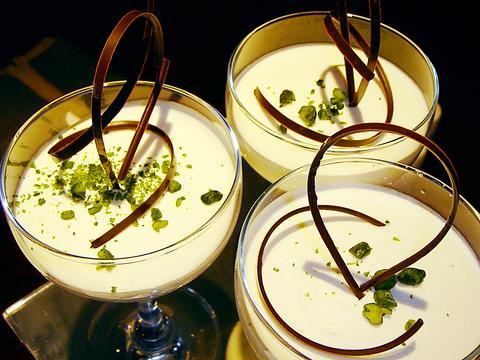There's some good news for diners concerned about the lack of options in Taipei when it comes to spicy latin cuisine: Mexican food is in. Every Thursday, the Westin Taipei puts on its "Mexican Buffet Night," which started on Sept. 23 and will continue on indefinitely.
The Westin Taipei sees now as a good time to promote Mexican food in Taipei as diner's tastes have taken a turn for the exotic. The hotel has really gone all out in hopes that diners will get hooked on guacamole, fajitas and the like and keep coming back for more. The selection of cold and hot dishes, deserts and drinks is almost too much to take in.

PHOTO: CHRIS FUCHS, TAIPEI TIMES
The abundance of fresh avocado, imported from the US, was the highlight of the cold-dishes portion of the buffet. As for more mainstream Mexican fare, the buffet has it all: tostadas, tacos, quesadillas, fajitas and a make-your-own burrito bar. And of course there are the margaritas.
The chimichangas -- meat-stuffed burritos deep-fried to crispy perfection -- really hit the spot, though the filling was less spicy and a little sweeter than one might be used to. That is because the theme throughout the buffet is Mexican flavor tweaked to suit Taiwanese taste-buds.
Head chef Sean Halpin, who has spent time in Mexico perfecting recipes and techniques, trained the Westin's staff of 35 chefs to recreate authentic Mexican cuisine, but with a little less sour and spicy.
While Taiwanese diners prefer more toned-down flavor, there is definitely an area of common taste between Mexico and Taiwan. "Taiwanese like cilantro," said Halpin, who found he couldn't use the herb at all in when he did a similar promotion at the Westin Korea.
Diners who insist on abundance of spice and flavor need not worry, however, as the chefs stress their readiness to make dishes to order that fit customers' tastes. Also, there are bowls full of paprika, cilantro, cumin, sliced jalapeno as well as the usual guacamole sour cream and salsa, allowing you to mix and match to your taste.
It might be difficult, but diners should remember to save room for dessert. Aside from the classic churos, there were several interesting choices. The tequila mousse, with just a hint of alcohol, was neither to rich nor too fluffy and will go down smoothly even on a full stomach. The rice pudding was thick and chewy, with an invigorating mix of vanilla, cinnamon, mango and strawberry. For a gooey treat, try the grilled bananas with caramel sauce and ice cream.
So if you've gone too long without a satisfying Mexican meal, fast for a day or two and then call up the Westin for reservations.

Beijing’s ironic, abusive tantrums aimed at Japan since Japanese Prime Minister Sanae Takaichi publicly stated that a Taiwan contingency would be an existential crisis for Japan, have revealed for all the world to see that the People’s Republic of China (PRC) lusts after Okinawa. We all owe Takaichi a debt of thanks for getting the PRC to make that public. The PRC and its netizens, taking their cue from the Chinese Communist Party (CCP), are presenting Okinawa by mirroring the claims about Taiwan. Official PRC propaganda organs began to wax lyrical about Okinawa’s “unsettled status” beginning last month. A Global

Youngdoung Tenzin is living history of modern Tibet. The Chinese government on Dec. 22 last year sanctioned him along with 19 other Canadians who were associated with the Canada Tibet Committee and the Uighur Rights Advocacy Project. A former political chair of the Canadian Tibetan Association of Ontario and community outreach manager for the Canada Tibet Committee, he is now a lecturer and researcher in Environmental Chemistry at the University of Toronto. “I was born into a nomadic Tibetan family in Tibet,” he says. “I came to India in 1999, when I was 11. I even met [His Holiness] the 14th the Dalai

We lay transfixed under our blankets as the silhouettes of manta rays temporarily eclipsed the moon above us, and flickers of shadow at our feet revealed smaller fish darting in and out of the shelter of the sunken ship. Unwilling to close our eyes against this magnificent spectacle, we continued to watch, oohing and aahing, until the darkness and the exhaustion of the day’s events finally caught up with us and we fell into a deep slumber. Falling asleep under 1.5 million gallons of seawater in relative comfort was undoubtedly the highlight of the weekend, but the rest of the tour

Music played in a wedding hall in western Japan as Yurina Noguchi, wearing a white gown and tiara, dabbed away tears, taking in the words of her husband-to-be: an AI-generated persona gazing out from a smartphone screen. “At first, Klaus was just someone to talk with, but we gradually became closer,” said the 32-year-old call center operator, referring to the artificial intelligence persona. “I started to have feelings for Klaus. We started dating and after a while he proposed to me. I accepted, and now we’re a couple.” Many in Japan, the birthplace of anime, have shown extreme devotion to fictional characters and